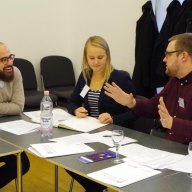Preparatory workshop on “Alternative Europe” at the annual conference of the Arbeitskreis Europäische Integration (AEI)

At the second workshop on the topic of “Alternative Europe!” organized by the Junges Europawissenschaftliches Netzwerk (JEN), the youth association of the Europawissenschaftliches Netzwerk Deutschland (END), we were not only able to tie in with the questions of the first workshop in Berlin, but also expand the discussion to include the question of the significance of emotions in politics. While the first meeting was strongly influenced by participants from think tanks and civil society, on December 1, 2016 European Studies scholars from various disciplines from universities and non-university research institutes met. The workshop took place in the context of the annual conference of the Arbeitskreis Europäische Integration (AEI) at the University of Mannheim.
Here, too, the group agreed that a more intensive cooperation between science and civil society would be fruitful for the development of a vision for the future of Europe. Based on two Scenario Challenges on Brexit and the European Elections 2019, the participants took up the questions formulated in Berlin:
- What common goal could we set ourselves in the new network?
- What topics do we want to address?
- What methods do we want to use to achieve this?
In the presentations of the results of the Scenario Challenges, two further points were addressed and then lively discussions followed: What role do emotions play in the current discourse on Europe? What can science contribute in terms of concrete visions of the future and European policy? Especially in the Challenge for the European Elections, it once again became clear that it is easier to pack negative messages into simple and emotionalizing campaigns than positive content. Due to its supposed simplicity, “EU bashing” often gets caught up more quickly, so that pro-Europeans usually “run after” a negative discourse. The group asked itself the question: If emotions function as “game changers”, what conclusions can be drawn from this for the communication of pro-European forces?
Although it seems easy to adopt and reverse the methods and strategies of Eurosceptic campaigns, science in particular must meet its own demands — pure populism is not enough. The participants agreed that we need strategies to convey scientific content in a way that is generally understandable. In this way, the various disciplines could provide concrete suggestions for politics and society. Several participants emphasized that it is particularly important to leave one’s own scientific bubble in order to use this potential productively. They said that content should be discussed with other disciplines, civil society and EU citizens and strategies should be developed to present it in an appealing way in a “post-factual” environment. This is the task that the participants want to tackle in a joint project in a broad network of science and civil society!



